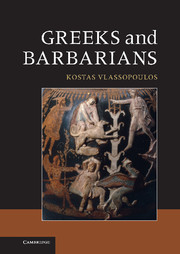Book contents
- Frontmatter
- Contents
- List of Maps and figures
- Acknowledgements
- Note to the reader
- List of Abbreviations
- 1 Introduction
- 2 The Panhellenic world and the world of empires
- 3 The world of networks and the world of apoikiai
- 4 Intercultural communication
- 5 The Barbarian repertoire in Greek culture
- 6 Globalisation and glocalisation
- 7 The Hellenistic world
- 8 Conclusions
- Bibliography
- Index locorum
- Index
1 - Introduction
Published online by Cambridge University Press: 05 June 2013
- Frontmatter
- Contents
- List of Maps and figures
- Acknowledgements
- Note to the reader
- List of Abbreviations
- 1 Introduction
- 2 The Panhellenic world and the world of empires
- 3 The world of networks and the world of apoikiai
- 4 Intercultural communication
- 5 The Barbarian repertoire in Greek culture
- 6 Globalisation and glocalisation
- 7 The Hellenistic world
- 8 Conclusions
- Bibliography
- Index locorum
- Index
Summary
Historiographies
Few topics in ancient history attract such wide attention as the relationship between Greeks and Barbarians. To mention just two recent Hollywood movies should be enough: Oliver Stone’s Alexander, on Alexander the Great’s overthrow of the Persian Empire and the conquest of various peoples in the East; and Frank Miller’s 300, on the battle of Thermopylae between the Greeks and the Persian Empire, were great commercial successes and created considerable cultural and political debates. But there are also few topics in ancient history that lead to such fundamental differences in scholarly approaches and views. On the one hand, there is a long-standing approach that focuses on polarity and conflict. The relationship between Greeks and Barbarians is seen as part of the wider distinction between West and East; the Greeks are the ancestors of the West, the people who invented democracy, freedom of thought, science, philosophy, drama and naturalistic art, and whose literary works stand as the foundation of Western literature; the world of the East, the world of the people whom the Greeks described as Barbarians, is a wholly different world, characterised by despotism and theocracy and the absence of all the Greek achievements. The confrontation of the Greeks with the Persian Empire was the fight to preserve these achievements and values that we still cherish, and should be seen as part of a perennial confrontation between West and East; back in 1846, John Stuart Mill expressed this view in a famous adage:
Even as an event in English history, the battle of Marathon is more important than the battle of Hastings. Had the outcome of that day been different, the Britons and the Saxons might still be roaming the woods.
- Type
- Chapter
- Information
- Greeks and Barbarians , pp. 1 - 33Publisher: Cambridge University PressPrint publication year: 2013

